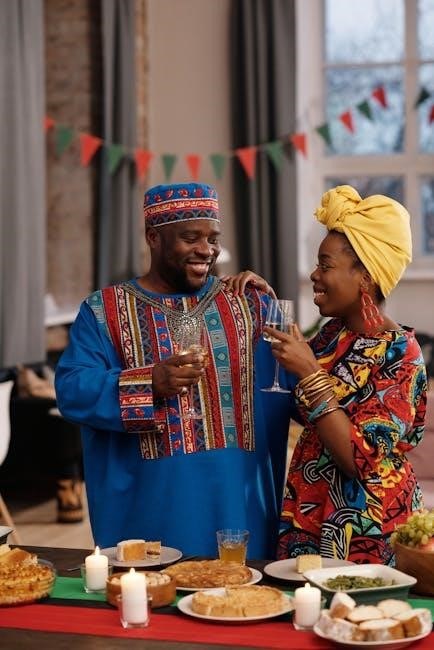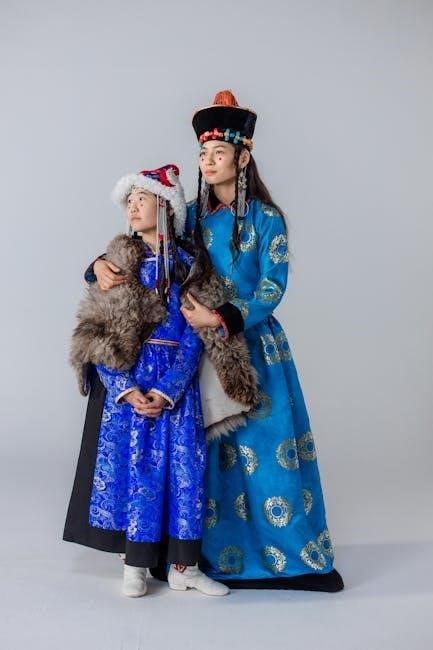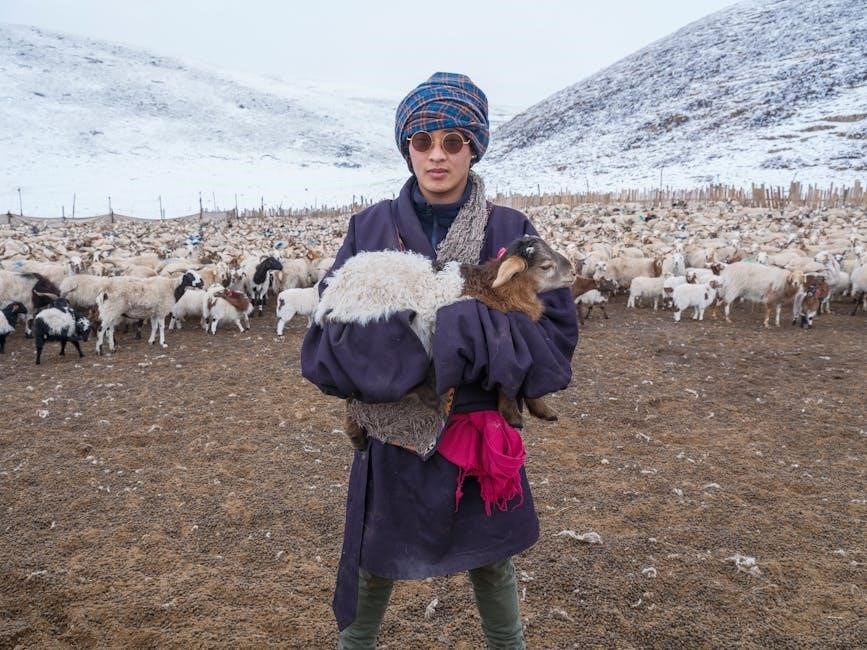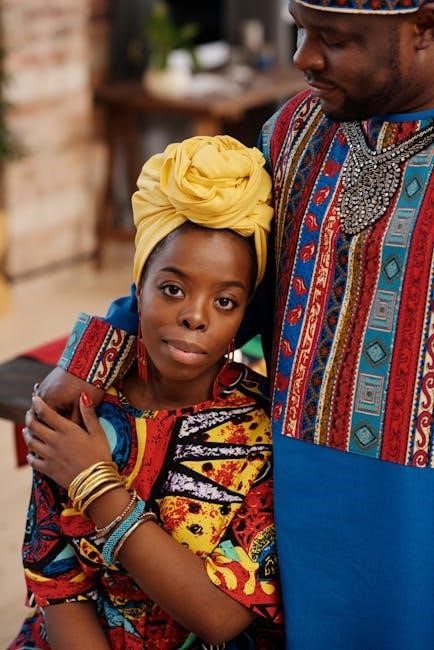Traditions and Encounters: A Global Perspective on the Past offers a comprehensive account of world cultures and interactions. Authored by experts, it explores themes of cultural traditions, encounters, and exchanges, providing a framework for cross-cultural comparisons. The PDF includes interactive tools for engaging learning experiences.

Authors and Contributors
Traditions and Encounters is authored by Jerry H. Bentley, Herbert F. Ziegler, Heather Streets-Salter, and Craig Benjamin. Their expertise in world history ensures a comprehensive and engaging narrative, supported by McGraw Hill’s educational resources for enhanced learning experiences.
Editions and Publication Details
Traditions and Encounters: A Global Perspective on the Past is available in its 6th and 7th editions, published by McGraw Hill. The 6th edition was released in 2024, while the 7th edition is the latest version, authored by Jerry H. Bentley and his team. The ISBN-10 for the 6th edition is 1264151233, and the ISBN-13 is 9781264151233. The book is available in PDF format, with files ranging from 400MB to 500MB, ensuring accessibility for digital learners. The 6th edition is divided into two volumes: Volume 1 covers from the beginning to 1500, and Volume 2 spans from 1500 to the present. Each chapter is available for individual download, with sizes varying between 4MB to 5MB. The text is supported by McGraw Hill’s Connect platform, offering adaptive learning tools like SmartBook, primary sources, and interactive maps. The 7th edition continues this legacy, providing updated content and resources for students and educators. The book’s digital version is compatible with ebook readers and PDF viewers, making it a versatile resource for studying world history.
Structure and Organization
Traditions and Encounters is organized into seven eras of global history, providing a clear framework for understanding cultural developments and cross-cultural interactions. The text is divided into volumes and chapters, with interactive tools like adaptive learning and primary sources enhancing engagement and comprehension.
Volume Breakdown
Traditions and Encounters is divided into two primary volumes, each focusing on distinct periods of global history. Volume 1 covers the earliest human societies up to 1500, exploring the rise of civilizations, religious traditions, and early cultural exchanges. Volume 2 spans from 1500 to the present, delving into global interactions, colonialism, industrialization, and contemporary issues. This division allows for a logical progression of historical events, making it easier for readers to follow the evolution of global cultures and their encounters. Each volume is further subdivided into chapters that address specific themes, regions, and time frames, ensuring a detailed yet cohesive narrative. The structure emphasizes connections between different eras and regions, providing a holistic understanding of world history. The PDF format of the textbook includes interactive features such as maps, primary sources, and adaptive learning tools, enhancing the learning experience. This organization makes Traditions and Encounters a valuable resource for students and scholars alike, offering both depth and accessibility.
Chapter Overview
Traditions and Encounters is structured into chapters that explore the development of global cultures and their interactions. Each chapter focuses on specific themes and time periods, providing a detailed narrative of historical events. For instance, chapters on transoceanic encounters and global connections highlight the exchange of ideas, goods, and cultures between regions. The text also includes chapters on the transformation of Europe, the rise of new worlds in the Americas, and the contemporary globalized world. Regional focuses, such as Asia and Europe, are intertwined with broader global themes, ensuring a balanced perspective. The chapters incorporate primary sources, visuals, and interactive elements in the PDF version, enhancing student engagement. Key concepts like cultural traditions, encounters, and globalization are woven throughout the chapters, offering a cohesive understanding of world history. The chapter organization encourages readers to analyze historical patterns and connections, making it an invaluable resource for students and educators alike. The PDF format also includes adaptive learning tools and interactive maps, further enriching the educational experience.
Key Themes
Traditions and Encounters emphasizes cultural exchange, globalization, and the interconnectedness of societies. It explores how traditions shape identities and encounters drive change, fostering cross-cultural understanding. These themes provide a framework for analyzing historical and contemporary global dynamics, offering insights into shared human experiences and divergent cultural practices.
Traditions
Traditions are deeply rooted cultural practices, beliefs, and values passed down through generations, shaping identities and societies. They provide stability and continuity, reflecting the history and values of a community. Traditions encompass rituals, customs, and knowledge systems, such as religious practices, social norms, and artistic expressions. They are transmitted through teaching and learning, ensuring their survival over time. While often seen as ancient, many traditions are invented to serve political or cultural purposes. Traditions influence how people live, interact, and understand their place in the world. They also evolve, adapting to changing contexts while retaining core elements. In Traditions and Encounters, traditions are explored as foundational to human culture, highlighting their role in shaping societies and individual experiences. The text emphasizes how traditions intersect with encounters, fostering both continuity and change. This dual focus provides a nuanced understanding of how traditions have historically shaped and been shaped by global interactions.
Encounters
Encounters refer to interactions between different cultures, societies, or individuals that shape historical and contemporary dynamics. These interactions often result from migration, trade, conflict, or technological advancements. Encounters have been pivotal in shaping global history, fostering cultural exchange, and creating new identities. They highlight the interconnectedness of the world, where diverse traditions meet, leading to both cooperation and conflict. Traditions and Encounters emphasizes how these interactions have influenced the development of societies, economies, and political systems. Encounters also reveal the complexities of human interaction, such as the blending of traditions, the transfer of knowledge, and the emergence of new cultural practices. By examining encounters, the text provides insights into how global connections have transformed the world, creating a shared yet diverse human experience. This theme underscores the dynamic nature of cultural exchange and its enduring impact on human history.
Cultural Exchange
Cultural exchange is a central theme in Traditions and Encounters, highlighting the transfer of ideas, technologies, and practices between societies. This process has enriched global diversity while fostering mutual understanding. Through trade networks, migrations, and imperial expansions, cultures have shared knowledge, religions, and innovations. The exchange of goods like silk, spices, and precious metals facilitated not only economic ties but also the diffusion of cultural practices. For instance, the spread of Buddhism from India to East Asia and the transmission of Greek knowledge to Islamic scholars exemplify the transformative power of cultural exchange. These interactions often led to the blending of traditions, creating syncretic cultures. However, exchange has also sometimes resulted in conflict or cultural homogenization. The text emphasizes how cultural exchange has shaped the modern world, making it a cornerstone of global history. By examining these exchanges, readers gain a deeper understanding of the interconnectedness of human societies and the dynamics of cultural evolution. This theme remains vital in today’s increasingly interconnected world.
Globalization

Globalization is a key theme in Traditions and Encounters, exploring how global connections have shaped human history. The text examines the historical roots of globalization, tracing the expansion of trade networks, technological advancements, and cultural exchanges. It highlights how globalization has fostered economic interdependence and cultural blending while also addressing its challenges, such as inequality and environmental impacts. The PDF emphasizes the interconnectedness of the world, illustrating how local traditions and global processes are intertwined. By analyzing globalization’s historical evolution, readers gain insights into its role in shaping modern societies; The text also discusses how globalization has accelerated in recent centuries, transforming the way people live, work, and interact. This theme underscores the complexity of global integration and its far-reaching consequences. Through detailed narratives and interactive tools, the PDF provides a comprehensive understanding of globalization’s past and present implications. This perspective helps students appreciate the interplay between local cultures and global systems in an increasingly interconnected world. The exploration of globalization in the text is both informative and thought-provoking, encouraging readers to reflect on its significance in shaping human history.

Historical Eras Covered

Traditions and Encounters spans ancient civilizations, the medieval period, the early modern era, the Industrial Revolution, and the contemporary world. It provides a chronological framework, connecting past events to modern global dynamics, offering a holistic view of historical development.
Ancient Civilizations
Traditions and Encounters delves into the origins and development of ancient civilizations, highlighting their cultural, social, and technological advancements. It explores the rise of Mesopotamia, Egypt, the Indus Valley, and China, emphasizing their contributions to writing, governance, and architecture. The text examines the role of rivers in shaping these societies and their traditions. Key themes include the emergence of religious beliefs, the development of trade networks, and the impact of environmental factors on cultural practices. By analyzing these civilizations, the book provides insights into the foundations of human history and the interconnectedness of early societies. The section also discusses the cultural exchanges and encounters that occurred between these civilizations, laying the groundwork for understanding global dynamics. Through a detailed narrative, Traditions and Encounters brings to life the richness and diversity of ancient cultures, offering a comprehensive perspective on their legacy in the modern world.
Medieval Period
Traditions and Encounters thoroughly examines the medieval period, a time of significant cultural, religious, and political transformations. The text highlights the rise of Christianity in Europe, the expansion of Islam across the Middle East and North Africa, and the flourishing of the Islamic Golden Age. It explores the cultural exchanges between Europe, Asia, and Africa, including the impact of the Silk Road and the spread of ideas, goods, and technologies. The medieval period also saw the rise of feudalism in Europe and the development of powerful empires such as the Mongol Empire, which facilitated global connections. The book discusses the role of religion in shaping societies, including the Catholic Church’s influence in Europe and the spread of Buddhism in Asia. Key events like the Crusades and the Black Death are analyzed for their profound effects on medieval societies. The section also delves into the intellectual and artistic advancements of the time, such as the preservation of classical knowledge and the emergence of new architectural styles. By focusing on these traditions and encounters, the text provides a nuanced understanding of the medieval world and its lasting legacy.
Early Modern Era
Traditions and Encounters delves into the transformative Early Modern Era, spanning the 15th to 18th centuries. This period witnessed the rise of European exploration, the Columbian Exchange, and the emergence of global trade networks. The text explores the cultural and religious shifts, such as the Protestant Reformation, which challenged traditional religious structures, and the Catholic Counter-Reformation. The era also saw the rise of powerful nation-states in Europe, such as Spain, France, and England, alongside the expansion of empires like the Ottoman Empire. The exchange of ideas, goods, and technologies between Europe, Asia, Africa, and the Americas is highlighted, emphasizing how these encounters reshaped societies. The book also examines the Enlightenment, which brought new intellectual traditions emphasizing reason, science, and individual rights. These developments laid the foundation for modern globalization and cultural diversity, while also addressing the challenges and conflicts that arose from these encounters. The section provides a detailed analysis of how traditions were preserved and transformed during this dynamic period.
Industrial Revolution
Traditions and Encounters examines the Industrial Revolution as a pivotal era that reshaped global traditions and encounters. Emerging in the late 18th and 19th centuries, this period introduced transformative technological advancements, such as the steam engine and mechanized production, which revolutionized industries and societies. The text highlights how industrialization fostered new economic systems, urbanization, and labor practices, creating both opportunities and challenges. It explores the global impact of industrialization, including the expansion of colonial empires and the intensification of global trade networks. The Industrial Revolution also led to significant cultural shifts, as traditional craftsmanship declined and new forms of mass production emerged. The book emphasizes the interconnectedness of the world during this era, illustrating how industrialization in Europe influenced economic and cultural developments in Asia, Africa, and the Americas. By focusing on these encounters, the text provides a nuanced understanding of how industrialization shaped modern global traditions and continues to influence contemporary societies. The section underscores the profound legacy of the Industrial Revolution in shaping the modern world.

Contemporary World
The Contemporary World section of Traditions and Encounters explores the complexities of modern globalization and its impact on cultural traditions. It examines how global interconnectedness has shaped identities, economies, and political systems in the late 20th and early 21st centuries. The text highlights the role of technology, such as the internet and social media, in creating new forms of cultural exchange and encounter. It also addresses the challenges of globalization, including cultural homogenization and the loss of traditional practices. The section discusses the rise of multinational corporations, international organizations, and their influence on global governance. Additionally, it delves into the tensions between tradition and modernity, emphasizing how societies navigate these dynamics to preserve their cultural heritage while embracing change. The contemporary world is portrayed as a place of both unity and diversity, where global encounters continue to redefine human experiences and traditions. The chapter provides a nuanced perspective on the interconnectedness of the modern world and its implications for future generations.

Regional Focus
Traditions and Encounters provides a comparative analysis of cultural, social, and political developments across regions, emphasizing their unique traditions and encounters. It explores Asia, Europe, Africa, the Americas, and Oceania, highlighting how regional identities were shaped by global interactions and cultural exchanges.
Asia
Asia, as a vast and diverse continent, plays a central role in Traditions and Encounters, highlighting its rich cultural heritage and historical significance. The text explores the development of major Asian civilizations, such as China, India, and Japan, emphasizing their unique traditions and contributions to global history. It delves into the spread of Buddhism, Hinduism, and Islam across the region, showcasing how these religions shaped cultural and social practices. The Mongol Empire’s impact on Asia is also examined, illustrating its role in facilitating trade and cultural exchange. Additionally, the text discusses the influence of maritime trade networks, such as the Silk Road, in connecting Asia to other regions. By focusing on both the internal dynamics of Asian societies and their interactions with the wider world, Traditions and Encounters provides a nuanced understanding of Asia’s historical and cultural significance.
Europe

Europe’s historical development and its global interactions are thoroughly explored in Traditions and Encounters. The text examines the continent’s medieval period, highlighting the rise of feudalism, the influence of the Catholic Church, and the cultural achievements of the Renaissance. It also delves into Europe’s role in shaping global history, particularly during the Age of Exploration and the Enlightenment. The book emphasizes Europe’s interactions with other regions, such as the transatlantic slave trade and colonialism, which profoundly impacted global dynamics. Additionally, the Industrial Revolution’s origins in Europe and its far-reaching effects on society and economy are discussed in detail. The text also explores Europe’s cultural traditions, including its philosophical, artistic, and scientific contributions. By analyzing both internal developments and external encounters, Traditions and Encounters provides a comprehensive understanding of Europe’s complex and evolving role in world history.



